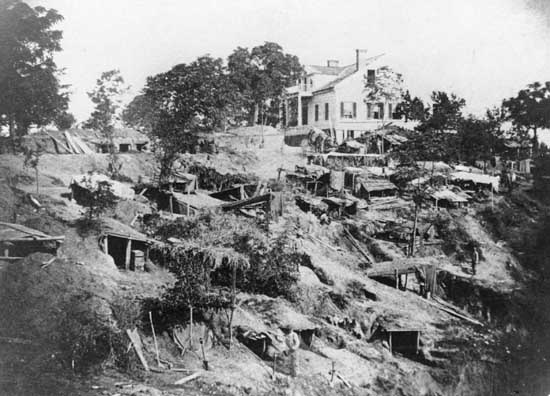Vicksburg Campaign
American Civil War
(1862–63), in the American Civil War, the campaign by Union forces to take the Confederate stronghold of Vicksburg, Mississippi, which lay on the east bank of the Mississippi River, halfway between Memphis (north) and New Orleans (south). The capture of Vicksburg divided the Confederacy and proved the military genius of Union General Ulysses S. Grant (Grant, Ulysses S.).
After the spring of 1862, when the Confederates lost Fort Henry, Fort Donelson, and Memphis in Tennessee and New Orleans in Louisiana, Vicksburg became the key remaining point of their defense of the Mississippi River. The capture of Vicksburg would yield the North control of the entire course of the river, and thus enable it to isolate those Confederate states that lay west of the river from those in the east. Vicksburg was ideally suited for defensive purposes, however; it was situated on high bluffs along the river and was protected on the north by a maze of swampy bayous. The Confederates' batteries on the bluffs could outgun any Union ships on the river.
 A Union naval expedition using ironclads (May–June 1862) to subdue the Confederate batteries failed, as did an attempt to take the city by land from the north by General William Tecumseh Sherman (Sherman, William Tecumseh) (December 1862) and an attempt by Grant to cut a canal around Vicksburg that would divert the river (February–March 1863). After this string of frustrating failures, Grant conceived a bold move that would enable him to take the city using the high-ground approaches from the east, well behind Confederate lines. Moving his army of 40,000 troops to the west bank of the Mississippi, he marched south along it for a considerable distance until he could recross the river at Bruinsburg, which lay about 30 miles (48 km) south of Vicksburg. His army recrossed to the east bank of the river by means of a Union fleet, which, under the command of Admiral David D. Porter (Porter, David Dixon), had run south past the batteries at Vicksburg. Once across the river, Grant quickly began moving northeast, though this meant abandoning his already tenuous supply lines and feeding his troops off the surrounding enemy countryside. His forces took Port Gibson on May 2, reached Grand Gulf on May 3, and prevented the small Confederate army of General Joseph E. Johnston (Johnston, Joseph E) near Jackson from linking up with the Vicksburg forces.
A Union naval expedition using ironclads (May–June 1862) to subdue the Confederate batteries failed, as did an attempt to take the city by land from the north by General William Tecumseh Sherman (Sherman, William Tecumseh) (December 1862) and an attempt by Grant to cut a canal around Vicksburg that would divert the river (February–March 1863). After this string of frustrating failures, Grant conceived a bold move that would enable him to take the city using the high-ground approaches from the east, well behind Confederate lines. Moving his army of 40,000 troops to the west bank of the Mississippi, he marched south along it for a considerable distance until he could recross the river at Bruinsburg, which lay about 30 miles (48 km) south of Vicksburg. His army recrossed to the east bank of the river by means of a Union fleet, which, under the command of Admiral David D. Porter (Porter, David Dixon), had run south past the batteries at Vicksburg. Once across the river, Grant quickly began moving northeast, though this meant abandoning his already tenuous supply lines and feeding his troops off the surrounding enemy countryside. His forces took Port Gibson on May 2, reached Grand Gulf on May 3, and prevented the small Confederate army of General Joseph E. Johnston (Johnston, Joseph E) near Jackson from linking up with the Vicksburg forces. Vicksburg's commander, General John C. Pemberton (Pemberton, John Clifford), led his forces out in an effort to link up with Johnston but met Grant moving westward and was forced to return to the city. On May 18 Grant arrived in the rear of Vicksburg, within which Pemberton's 30,000 troops were isolated. After two assaults in mid-May failed, Grant settled down to methodical siege tactics while augmenting his forces. He controlled all the approaches to the city, and by early June the Confederate garrison was desperately short of ammunition and on the brink of starvation. Pemberton surrendered the city on July 4.
Vicksburg's commander, General John C. Pemberton (Pemberton, John Clifford), led his forces out in an effort to link up with Johnston but met Grant moving westward and was forced to return to the city. On May 18 Grant arrived in the rear of Vicksburg, within which Pemberton's 30,000 troops were isolated. After two assaults in mid-May failed, Grant settled down to methodical siege tactics while augmenting his forces. He controlled all the approaches to the city, and by early June the Confederate garrison was desperately short of ammunition and on the brink of starvation. Pemberton surrendered the city on July 4. The surrender of Vicksburg, with the victory at the Battle of Gettysburg (Gettysburg, Battle of) the previous day (July 3), greatly heartened the North and in fact marked the turning point of the war.